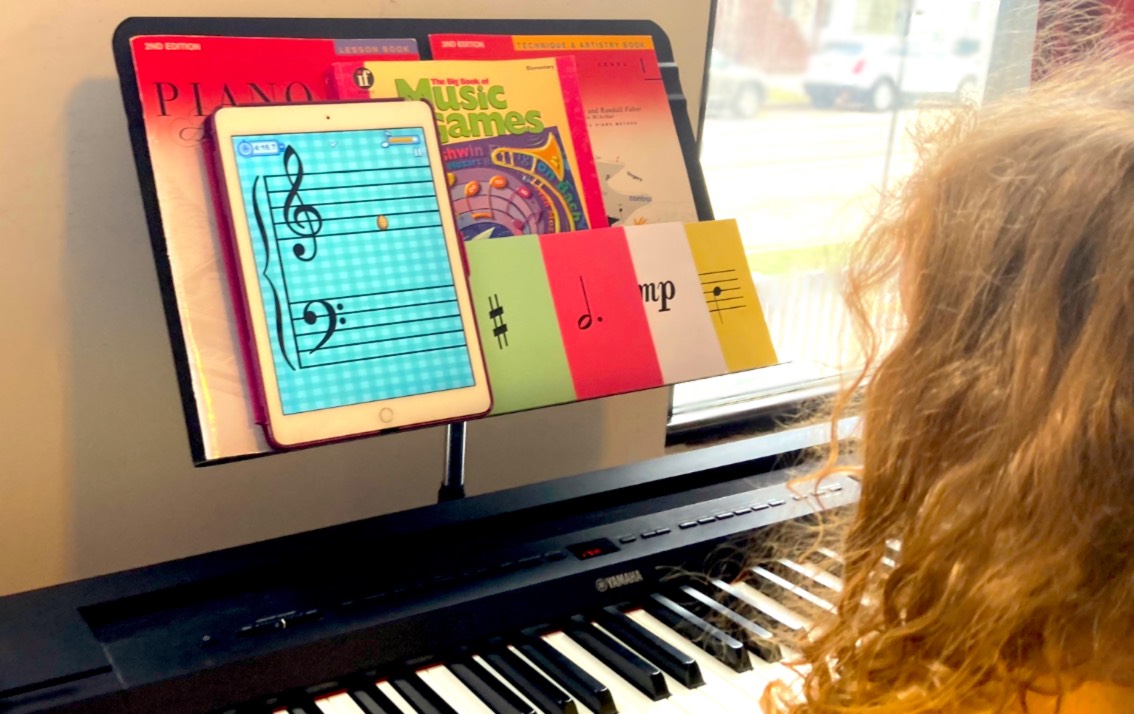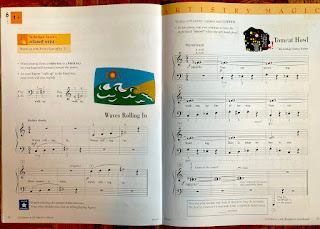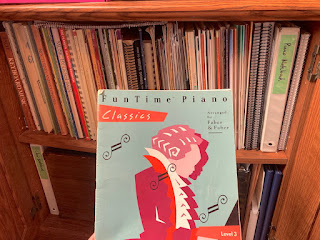Beginner piano lessons are foundational for music reading skills, healthy technique, and audiating music. While there are many great resources for teaching beginner piano, the following have been effective and engaging for my students. Listed below are my beginner piano curriculum must-haves.
1. Piano Adventures Method
The Piano Adventures Basic Method is comprised of 8 levels (Primer, Level 1, Level 2A, Level 2B, Level 3A, Level 3B, Level 4, and Level 5). There are 4 core books per level; I typically assign two. Recently, I have chosen the Technique & Artistry books. The exercises provided are fun and give detailed instructions and fun illustrations for executing many different articulations in a healthy way.I appreciate the progressive difficultly of reading skills, the colorful pictures, and the amusing lyrics in this series. It also has backing tracks for each piece for free on the Piano Adventures Digital Cloud. Many duets are written in the books for the teacher and student to play together. I love the duets because I believe providing ensemble experience is a cornerstone of music education.
In addition to the Basic Method for elementary-aged children, Piano Adventures has additional methods specially designed for preschoolers, teenagers, and adults. They are adapted to the learning styles of each age group and enter into the Basic Method at various points. For example, the adult method prepares beginner pianists for Lesson Book 3B in the basic method.
Click here for a PDF showing all of the Piano Adventures publications and how they relate. Stay tuned for reviews of the various method series from Faber Piano Adventures.
2. Alfred Complete Color-Coded Flashcards
This set has 89 cards. This deck has all the concepts a beginner student will learn in the method books. They reinforce note reading on the treble and bass clefs, common musical terms, rhythms symbols, and articulations.
To use the Alfred Complete Color-Coded Flashcards, I mark the answer side with a color-coded number. The colors match the Piano Adventures book in which the concept is first introduced and the number matches the unit. This way during a lesson, I can quickly pull the current flashcards.
3. Note Rush app
Note Rush is a cool app for quizzing notes on any instrument. Using various themes, such as bugs, outer space, and holidays, Note Rush shows you notes on the grand staff one by one and hears you play the note. You do not need a MIDI cable to use this app, but it does have that feature if you would like it. You are able to turn the timed test feature on and off and build your own quizzes that can be shared with your student to practice at home via a link or QR code.4. Board Games
My favorite resource for music games is Joy Morin's Color In My Piano blog. My favorite games are Grand Staff Pass, Ice Cream Intervals, and The Amazing Keyboard Race. Another resource I have is The Big Book of Music Games that has games to copy, color, and assemble on file folders. While it is more geared toward general music class, it has many games suitable for 2 players as well.5. Elective Book
I firmly believe in providing students with additional piano literature outside of the method books. The more the better and I do count working on extra music as practice time. The reason is that self-guided learning in conjunction with enthusiasm for the music quickly builds neural passageways and takes away the drudgery that can often accompany the thought of an upcoming practice session.As I think back to learning how to play piano, I loved having a library of piano books at my level and beyond. I pushed myself to learn "My Heart Will Go On" from a book of popular piano songs. I worked on the Faber ShowTime to BigTime Library series books spanning pop, jazz, classical arrangements, ragtime, hymns and Christmas music. The experience I gained from regularly playing for enjoyment allowed me to progress through intermediate piano literature very quickly. I love to lend my books to my students and I also encourage them to build a music library at home comprised of exciting music books.
6. Theory Worksheets
7. Music Learning Theory
The resources on The Improving Musician website are very helpful tools for learning to audiate various tonalities. Check out this resource explaining the process.









